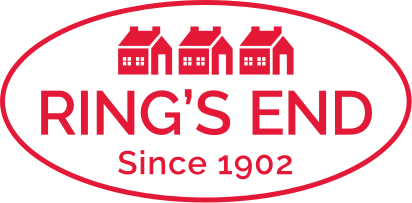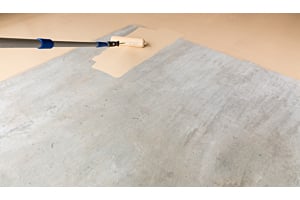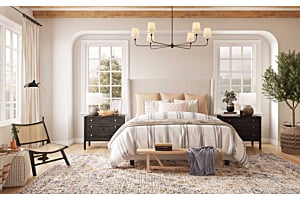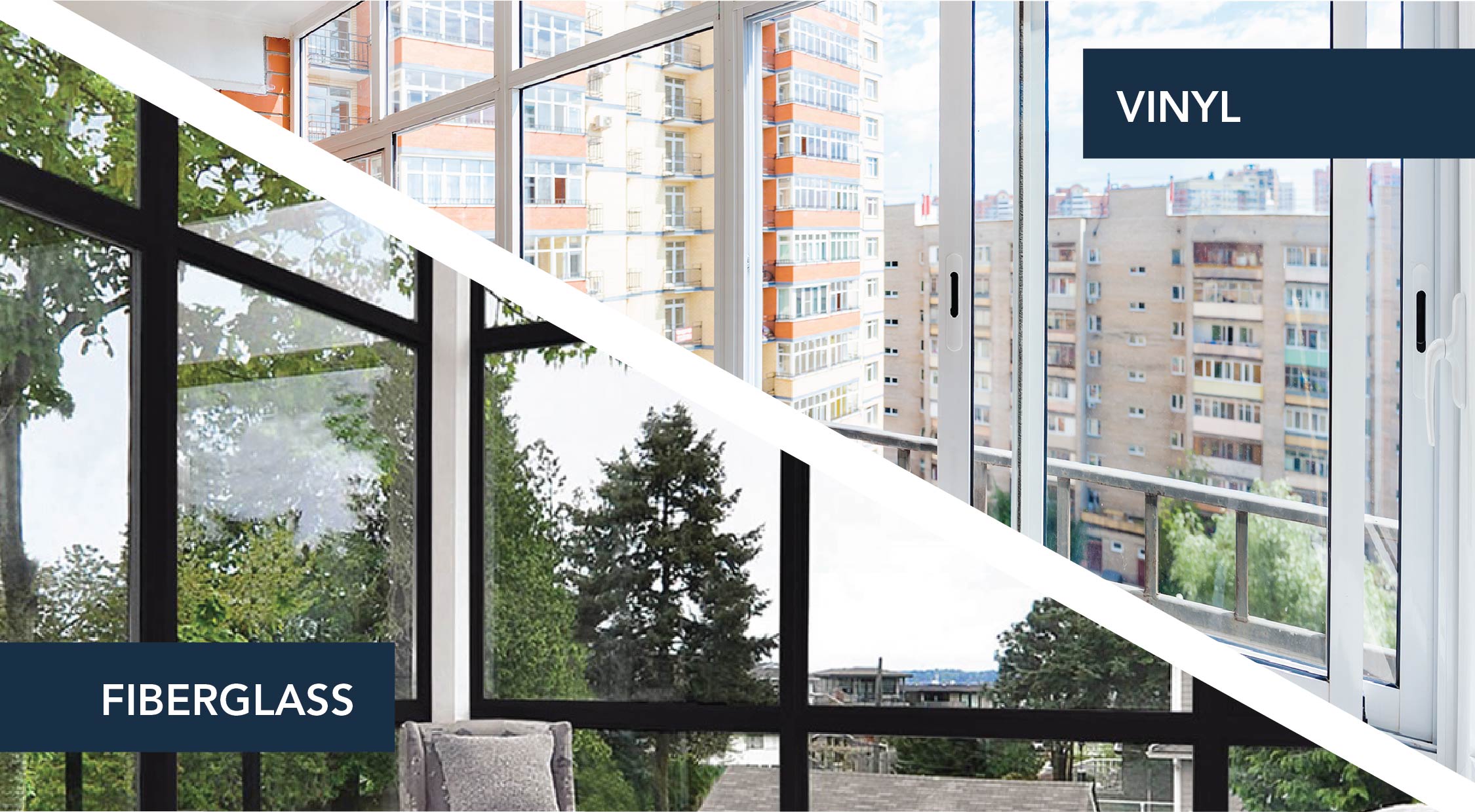
Choosing the right window material for your home is a crucial decision that impacts everything from energy efficiency to curb appeal and resale value. Among today’s most popular options are vinyl and fiberglass windows, each offering unique benefits for various needs, climates, and budgets. This guide breaks down the key differences between these window options to help you make an informed decision for your new construction or replacement windows.
What are fiberglass windows?
Fiberglass windows represent a premium choice for homeowners seeking unparalleled durability and energy efficiency. Crafted from glass fibers bound with specialized resin, these windows are manufactured through an advanced process that results in a material stronger than vinyl and even aluminum. Marvin, a leader in the industry, utilizes their proprietary Ultrex® fiberglass material to create windows that withstand extreme temperatures and harsh weather conditions.
Fiberglass windows are particularly suited for areas like the Northeast, where climates can range from hot summers to freezing winters. They expand and contract at nearly the same rate as the glass within them, reducing the chance of seal failure and ensuring long-term performance. With a slim profile that maximizes glass area, Marvin's fiberglass windows allow more natural light into your home while offering a sleek, modern aesthetic.
Key Characteristics of Fiberglass Windows
Fiberglass windows are known for several standout features that make them ideal for homeowners who prioritize durability and energy efficiency. With minimal thermal expansion and contraction, these windows provide superior insulation, minimizing heat transfer and maintaining comfortable indoor temperatures regardless of climate.
In addition to excellent performance, fiberglass window frames are customizable with a variety of color options, including darker shades, which resist fading and warping. These windows are highly recommended for contemporary designs that require expansive panes and thin frames, providing a sleek, modern look.
Fiberglass windows typically require professional installation due to their precise manufacturing specifications and the need for exact measurements to ensure a perfect fit and optimal performance. Professional window installers have the expertise to handle the rigid material correctly, ensuring proper sealing, alignment, and adherence to manufacturer requirements, which is crucial for maintaining warranties like those offered by Marvin.
Extruded Vinyl vs. Vinyl-Clad
The term “vinyl windows” typically refers to windows with frames made entirely from extruded vinyl. Another option is vinyl-clad windows, which are wood windows wrapped in PVC. This keeps many of the advantages of the PVC but reduces some of the disadvantages, like warping, since the wood interior adds temperature stability.
What are vinyl windows?
Vinyl windows, made from polyvinyl chloride (PVC), offer an affordable, cost-effective solution for those looking for new windows that balance performance with budget considerations. These window frames are manufactured through an extrusion process, where molten PVC is shaped into frames and then cooled to harden. Vinyl windows are an eco-friendly choice for those focused on energy efficiency and affordability, as they are recyclable and help reduce energy consumption by insulating the home.
Though vinyl is a durable material, it’s more sensitive to extreme temperatures than fiberglass. Temperature fluctuations can cause vinyl to expand and contract, potentially impacting the seals over time. Vinyl windows are generally available in standard sizes and styles, making them an accessible option for DIY installations.
Key Characteristics of Vinyl Windows
Vinyl windows are praised for their low maintenance needs and budget-friendly price point. This affordability doesn’t come at the expense of insulation, as vinyl windows offer good thermal performance in moderate climates. Although they lack the design flexibility and slim frames of fiberglass, vinyl windows remain a popular choice for homeowners looking to replace wood windows or install new windows that won’t require frequent upkeep.
Vinyl windows typically come in lighter color options to reduce heat absorption, and they feature wider frames, which are ideal for traditional styles. However, because vinyl is less rigid than fiberglass, it may not support larger panes of glass without additional reinforcement.
Fiberglass vs. Vinyl Windows: 6 Key Differences
Both types of window materials are popular for a reason! Fiberglass and vinyl are good insulators, low maintenance, and come in a variety of color options. Ultimately, the best choice for a home’s windows comes down to budget and performance needs. Vinyl is the more cost-effective option, while fiberglass offers better energy efficiency and durability as well as more design options.
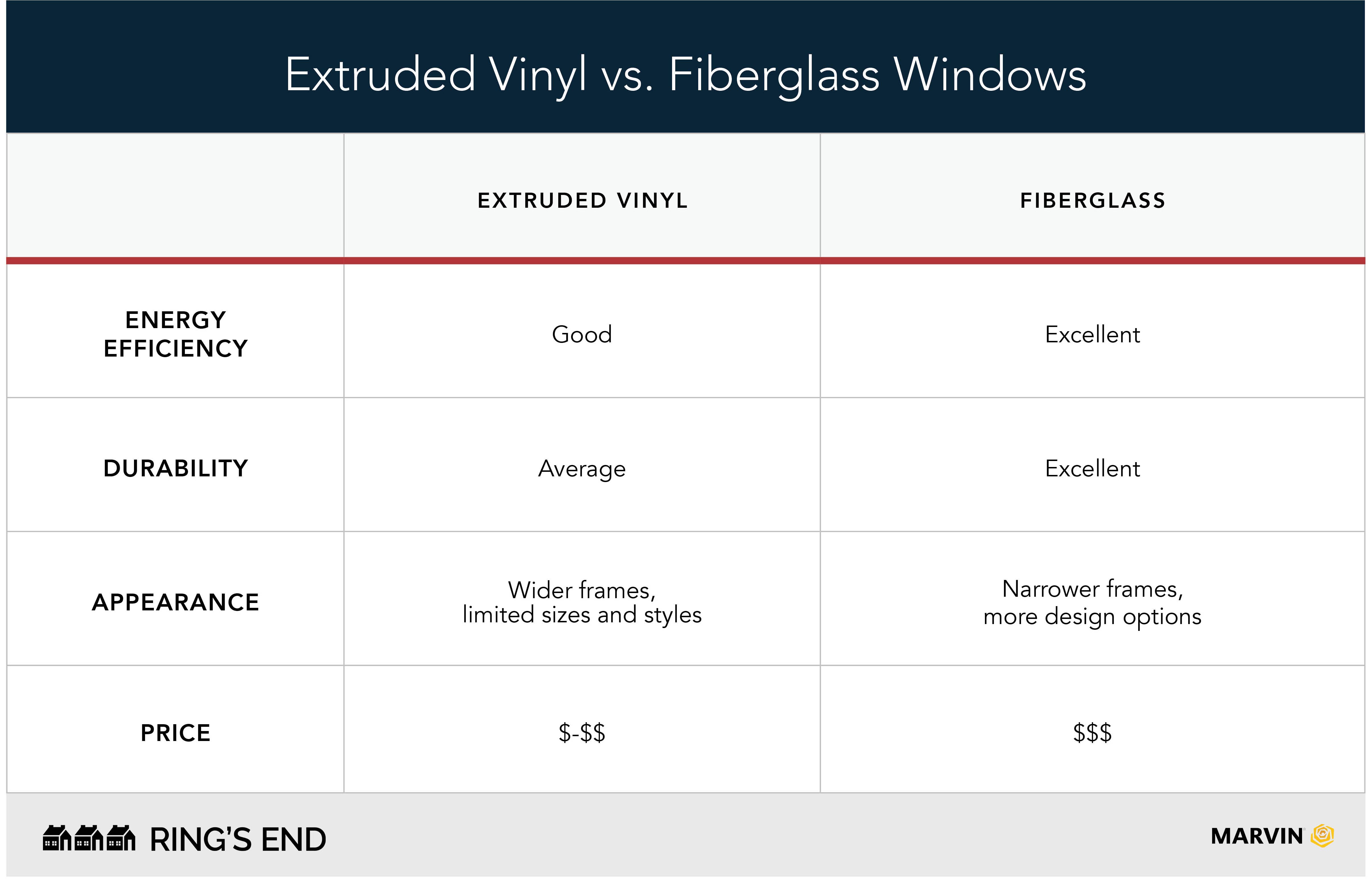
Energy Efficiency
Energy efficiency is a significant factor for many homeowners when selecting the best window material. Both vinyl and fiberglass offer excellent insulation, particularly when paired with double-pane or triple-pane glass and low-e coatings. However, fiberglass takes the lead in extreme temperatures due to its structural stability and minimal expansion and contraction.
Fiberglass’s low thermal conductivity makes it a superior insulator, which helps maintain stable indoor temperatures even during hot or cold weather. This insulation capability also extends to noise reduction, making fiberglass windows an ideal choice for homes near busy roads or other noisy areas. Vinyl windows are also energy-efficient but more prone to slight temperature-related expansion, which may affect their insulation properties in the long run.
Durability and Lifespan
When it comes to durability, fiberglass windows significantly outperform vinyl. Fiberglass window frames can last up to 50 years, making them a wise investment for homeowners seeking long-lasting performance. This longevity is due to fiberglass’s resistance to warping, even in areas with extreme weather conditions. Fiberglass windows also have a strength-to-weight ratio that supports large glass panes without compromising structural integrity.
Vinyl windows, while durable and typically lasting 20-30 years, are susceptible to warping and seal failure over time, particularly if exposed to high temperatures. The durability of vinyl windows can vary by quality, with higher-end products offering a more reliable option for moderate climates.
Appearance & Design Flexibility
Fiberglass and vinyl windows differ notably in appearance and customization options. Fiberglass offers a thinner frame that maximizes the viewable glass area, bringing in more natural light. This characteristic makes fiberglass windows especially popular in modern home designs where large glass expanses are desired. Additionally, fiberglass frames come in a variety of color options, including darker hues that don’t risk warping due to heat. Brands like Marvin and Infinity have pushed innovation in fiberglass color technology, making them a top choice for luxury homes.
Vinyl windows, while available in several standard colors, are limited to lighter shades to minimize heat absorption. They have wider frames with visible seams, giving them a more traditional look that suits classic home designs. However, because vinyl is less rigid, it is typically only available in standard sizes and styles, limiting its flexibility in design compared to fiberglass.
Cost
Cost is often a primary consideration for homeowners, especially for those comparing replacement windows. Vinyl windows are generally more affordable and cost-effective, making them a practical choice for budget-conscious projects. The affordability of vinyl makes it an attractive option for moderate climates where extreme durability is less critical.
Fiberglass windows, on the other hand, have a much higher initial cost. This price difference reflects their superior longevity and performance, particularly in harsh climates. Homeowners willing to make a long-term investment in energy efficiency and durability may find fiberglass windows to be a worthwhile upgrade that ultimately offers lower maintenance costs over time and reduces their energy bill.
Impact on Home Value
Both fiberglass and vinyl windows can enhance home value when replacing outdated or inefficient windows. As a premium product, fiberglass is considered a high-value upgrade, particularly appealing in high-end markets and for quality-conscious buyers. In addition to energy efficiency, fiberglass windows also appeal to eco-friendly buyers for their sustainable manufacturing process and longevity.
Vinyl windows provide a solid return on investment for mid-range homes, adding appeal for buyers seeking a balance of affordability and efficiency. While vinyl may not add as much value as fiberglass in luxury markets, it remains a good option for homeowners wanting to improve energy efficiency without a high upfront cost.
Environmental Impact and Sustainability
Eco-friendly windows are highly valued. Fiberglass, often manufactured using sustainable materials and lasting up to 50 years, offers an eco-friendly option due to its extended lifespan and minimal need for replacement. Additionally, fiberglass frames are recyclable and contribute to a lower environmental footprint over time.
Vinyl windows are also becoming increasingly eco-friendly as recycling technology improves. Made from PVC, vinyl has historically been challenging to recycle, but modern advancements are helping to reduce its environmental impact. For homeowners seeking a more budget-conscious green option, vinyl remains a viable choice.
Do fiberglass windows increase a home's resale value?
A common concern is whether a particular window material will increase (or decrease) a home’s value. As a general rule, replacing old windows with new, energy efficient materials is a good idea — whether vinyl or fiberglass. The specific effect this has on the home’s value depends on a lot of other factors.
In some situations, all the buyer will notice is that the windows are new and made from materials that help insulate the home well. However, fiberglass windows are a more premium option and buying from a trusted name like Marvin may make a difference when selling a higher-end home.
Why We Recommend Marvin’s Fiberglass Windows
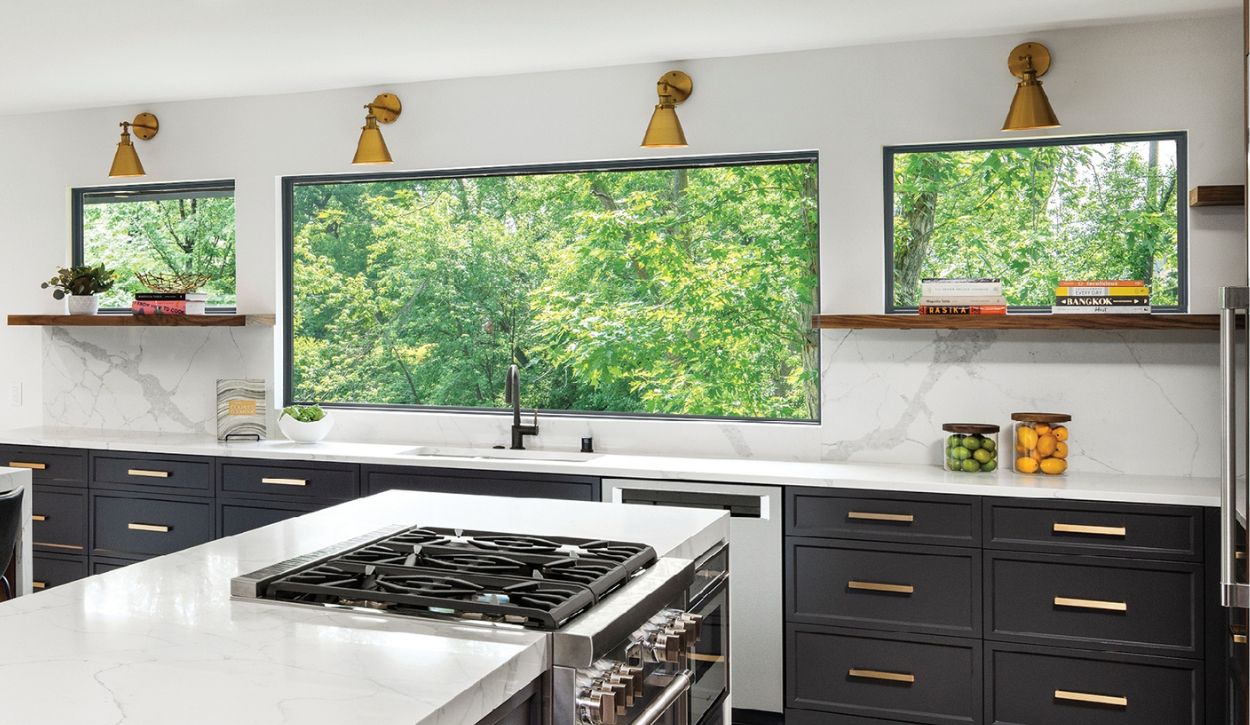 Modern Kitchen featuring Marvin Essential Direct Glaze Windows
Modern Kitchen featuring Marvin Essential Direct Glaze Windows
Marvin is a trusted window brand and a leading manufacturer of fiberglass windows. Marvin’s proprietary Ultrex® fiberglass material is eight times stronger than vinyl. Homeowners can also choose Marvin windows protected by high-density fiberglass exteriors — Marvin’s strongest fiberglass material yet.
If fiberglass windows are the right choice for your project, we highly recommend Marvin’s premium-quality fiberglass windows. The Marvin brand consistently innovates designs that meet the highest standards for both performance and craftsmanship.
Ring’s End is proud to be the top Marvin windows dealer in the Northeast, supplying contractors and homeowners with new windows and replacement windows they can trust. If you have any questions about window materials or Marvin windows, please contact our window team using our online chat, by phone, or by texting (203)-PRO-HELP. We’d love to discuss your project!
